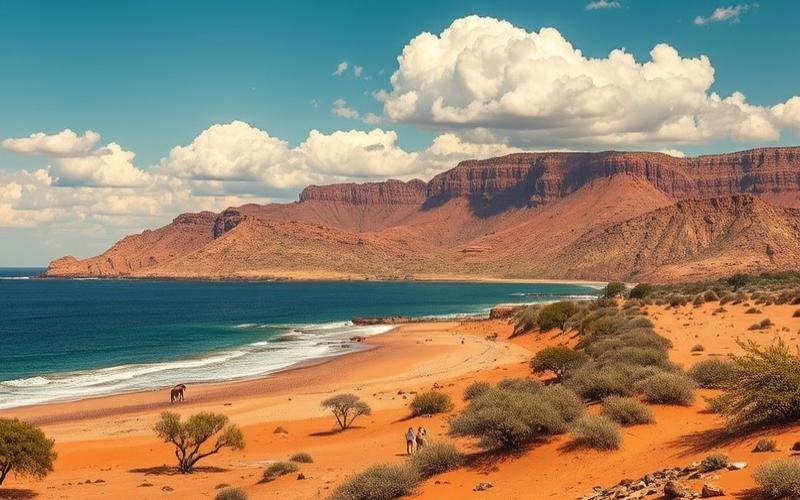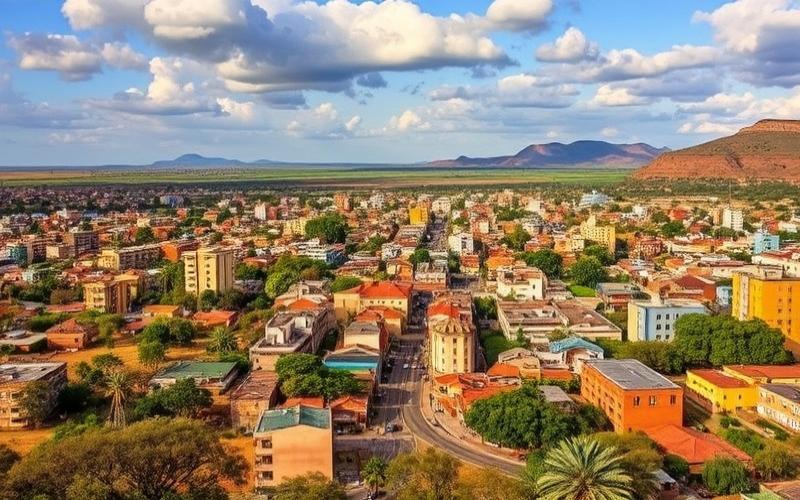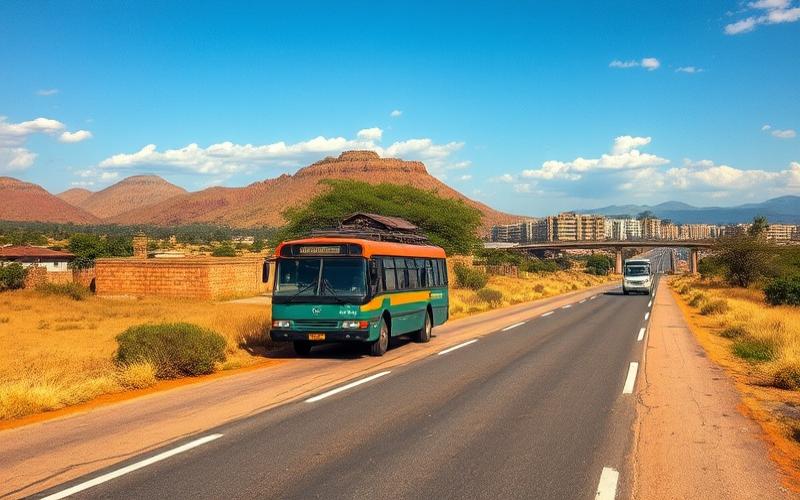
 Published on and written by Cyril Jarnias
Published on and written by Cyril Jarnias
South Africa, with its breathtaking landscapes and rich cultural heritage, attracts millions of visitors from around the world each year, making it a prime destination for the tourist accommodation sector.
However, navigating this country’s regulatory framework for accommodations can prove complex for investors and owners looking to capitalize on this booming market. From the need to obtain specific licenses to safety standards imposed by authorities, understanding legal requirements is essential to ensure not only compliance but also business success.
This article aims to demystify the administrative and legal procedures essential for any tourist accommodation project in South Africa, offering a practical guide to avoid pitfalls and optimize business opportunities.
Procedures for Obtaining Seasonal Rental Authorization in South Africa
To obtain seasonal rental authorization in South Africa, owners must follow several specific steps. Procedures vary by municipality, but some general principles apply nationwide.
Steps to Follow for Authorization
- Verify the possibility of seasonal rental in your building or condominium (internal regulations, potential consent from co-owners).
- Inquire with the local municipality about specific requirements (some cities impose licenses or mandatory registration).
- Complete the registration form provided by the municipality.
- Submit required documents and pay applicable fees.
- Await potential inspection and validation by local authorities before receiving official authorization.
Generally Required Documents
- Copy of property title or lease agreement
- Proof of home insurance covering seasonal rental
- Owner’s identification document
- Detailed housing plan (number of rooms, amenities)
- Certificate proving compliance with local health and safety standards
- Tax declaration related to VAT (14% applicable on rental income)
- Written agreement if you are a tenant
Applicable Fees
| Fee Type | Estimated Amount |
|---|---|
| Registration fees | Varies by city |
| Inspection/safety | Variable |
| VAT | 14% on income |
The exact amount will always depend on municipal requirements.
Involved Competent Authorities
- Local municipality: manages applications, issues authorizations.
- National tax department: collects and controls VAT.
- Local health services: checks hygiene/safety compliance.
Typical Approval Timeframes
The average duration varies between 2 weeks and several months, depending on:
- Local administrative efficiency
- Current volume of applications
- Whether physical inspection is necessary
Some major cities may impose longer delays due to the high number of files to process.
Specific Conditions by Region/Municipality
Main differences concern:
- Whether obtaining a specific short-term license is mandatory;
- Restrictions related to urban zoning;
- Maximum annual number allowed per property;
- Strict or flexible application regarding inspections;
Therefore, it is essential for each owner to consult their local town hall before any procedure.
Legal Consequences Without Authorization
Operating a seasonal rental without obtaining all authorizations exposes one to:
- Significant administrative fines potentially reaching several thousand euros/rands.
- Immediate suspension or even permanent ban on tourist rental activity.
- Legal obligation to regularize the situation under penalty of civil and tax prosecution.
⚠️ Operating a property without an official number or license exposes the owner to a fine of up to R50,000, as well as immediate administrative closure.
Useful Resources for Additional Help/Advice
- Local municipal services (Urban Planning / City Council)
- Real estate agencies specialized in short-term tourist rentals
- Official government websites dedicated to South African real estate entrepreneurs
- Local professional associations in the real estate sector
In case of doubt, it is advisable to consult a legal advisor specialized in local real estate law, to guarantee full compliance with all applicable regulations.
Good to Know:
In South Africa, owners wishing to obtain seasonal rental authorization must submit an application accompanied by documents such as the property title, a fire safety compliance certificate, and pay fees that vary by municipality; approval times can take up to three months and any rental without authorization can result in significant fines. For assistance, owners can contact their local city council or turn to the national tourist accommodation association for additional advice.
Key Regulations for Expatriates Wishing to Become Landlords
Licenses and Permits to Become a Tourist Landlord
To operate a tourist rental business in South Africa, it is necessary to obtain a work permit or an investment visa, depending on the type of activity planned. The application is made at the South African consulate or embassy, with submission of the following documents: completed official form, valid passport, financial proofs, and proof of international health insurance. A temporary visa must be obtained before any application for permanent residence.
| Permit Type | Reason | Validity | Procedures |
|---|---|---|---|
| Work | Employee/local | According to contract | Prior offer mandatory |
| Investment | Business creation/purchase | Variable | Financial proofs |
There is currently no single license for private tourist rental; however, some municipalities require property registration with local authorities to comply with tourism standards.
Tax Obligations for Expatriates
- Expatriates are taxed on their rental income generated in South Africa.
- It is mandatory to declare this income to the South African tax authorities.
- Rents received may be subject to specific withholding tax for non-residents.
- To optimize one’s tax situation (possible deductions), it is highly recommended to consult a local tax expert.
List of Main Obligations:
- Annual declaration of rental income
- Payment of associated taxes (rate varies by tax status)
- Compliance with deadlines and formats imposed by the tax administration
Management and Maintenance of Rented Properties
The owner-landlord must ensure regular management and routine maintenance of the housing so that it meets minimum standards imposed by municipalities:
Main Legal Requirements:
- Maintenance in good general condition (plumbing, electricity)
- Regular provision of essential services (hot water, fire safety)
- Strict compliance with local rules regarding noise and sanitation
Municipal checks may occur following a report or during administrative renewal.
Safety Requirements
Regulations impose:
- Mandatory installation of fire alarms
- Presence of fire extinguishers in tourist accommodations
- Clearly marked emergency exits
Some cities also require the property to be equipped against theft (window bars or anti-intrusion system).
Mandatory or Recommended Insurance
Although no insurance is legally imposed at the national level for renting one’s property, it is strongly recommended – and sometimes locally required – to subscribe to:
Useful List:
- Multi-risk home insurance covering major damages
- Civil liability insurance towards clients/tenants
- Optional legal protection against rental disputes
Owners working with agencies may sometimes need to justify these coverages during administrative filing.
Restrictions on Real Estate Purchase/Operation by Foreigners
Foreigners can freely purchase any type of residential property; there are currently no major restrictions. However:
- Some banks require a higher down payment from non-residents wishing to finance their purchase through a mortgage.
- It is prudent to use a South African notary to secure all administrative steps.
Useful Local Resources:
Main Lists:
- French-speaking notaries specialized in international real estate
- Licensed real estate agents familiar with local regulations
- Bilingual tax experts specialized in non-residents
- Consular services offering administrative assistance on site
Good to Know:
To become a landlord in South Africa, expatriates must obtain a specific tourist rental permit and comply with tax obligations such as declaring rental income; it is also important to subscribe to insurance for property protection and client safety, while adhering to restrictions regarding property acquisition and rental by foreigners.
Practical Tips for Complying with Tourism Standards
Understanding Laws and Obtaining Necessary Documents
It is essential to thoroughly understand local legislation regarding tourist accommodation to avoid any penalties or administrative closure. Owners should inquire with municipalities about:
- Building permits (for any modification or construction)
- Operating authorizations (essential for opening a guest house, B&B, lodge, or any other tourist accommodation)
To obtain these documents:
- Go to the town hall of the location.
- Prepare a file including plans, project description, and compliance certificates.
- Anticipate administrative delays which may vary by province.
Concrete example: Thabo, owner of a cottage near Durban, explains he obtained his permit after consulting the city’s official website and meeting several times with the municipal inspector to validate his installations.
Preparing Your Establishment for Health and Safety Inspections
Authorities regularly conduct checks focusing on:
- General condition of premises
- Cleanliness of rooms and common areas
- Presence of safety equipment (verified fire extinguishers, clear exits)
Practical tips:
- Implement a monthly checklist including food hygiene, housekeeping, and technical maintenance.
- Train staff to respond effectively during surprise inspections.
A testimony: Fatima runs a guest house in Cape Town. She emphasizes the importance of “having all certificates displayed in the lobby” — this reassures both inspectors and clients.
Environmental Protection & Energy Saving: Specific Requirements
| Sustainable Practice | Advantage | Specific Example |
|---|---|---|
| Selective sorting | Waste reduction | Provision of separate bins |
| LED bulbs | Lower electricity consumption | Gradual replacement |
| Water-saving systems | Reduced bills + resource preservation | Low-pressure showerheads |
| Use of local products | Support local economy & reduce CO2 footprint | Menus with local fruits/vegetables |
Many South African establishments invest in solar panels or rainwater harvesting systems.
Example: Safari Green Lodge cut its energy bill in half thanks to photovoltaic solar installation combined with an automatic system to turn off air conditioning when no one is present in a room.
Training Staff: Ensuring Regulatory Compliance & Service Quality
Organize regularly:
- Sessions on customer service, confidential handling of personal data,
- Practical workshops on waste sorting, daily eco-friendly gestures,
- Awareness of local standards (especially fire safety).
Involve each employee through a trained internal referent who relays all new directives.
Testimony: Sipho, supervisor at a backpacker lodge, explains that “continuous training not only helps limit errors during official checks but also significantly improves the customer experience.”
Communicating with Local Authorities: Staying Informed
Maintaining an ongoing relationship with the municipality or local tourism department allows:
- Being quickly informed in case of regulatory changes,
- Participating in sector meetings where legislative updates are discussed.
Practical tips:
- Subscribe to official newsletters,
- Attend regional professional forums.
Real example: The manager of Ocean View Guest House receives all updates every quarter via email regarding the recent obligation to clearly display prices including taxes starting in January.
Good to Know:
Ensure you thoroughly master local accommodation laws in South Africa and properly prepare your establishment for health inspections, as Louise, owner of a guest house compliant with environmental and energy standards, did; she also recommends regularly training staff to maintain excellent customer service and staying in contact with authorities to anticipate regulatory changes.
Disclaimer: The information provided on this website is for informational purposes only and does not constitute financial, legal, or professional advice. We encourage you to consult qualified experts before making any investment, real estate, or expatriation decisions. Although we strive to maintain up-to-date and accurate information, we do not guarantee the completeness, accuracy, or timeliness of the proposed content. As investment and expatriation involve risks, we disclaim any liability for potential losses or damages arising from the use of this site. Your use of this site confirms your acceptance of these terms and your understanding of the associated risks.
























































